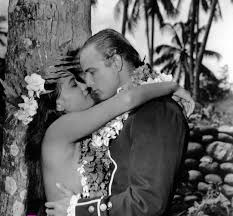April 27, 2018:
The word “mutiny” usually triggers the word “Bounty” and regardless of when you were born, the image of Fletcher Christian is that of a hero whether he is portrayed by Clark Gable, Marlon Brando or Mel Gibson. Captain Bligh is a villainous tyrant whether he is played by Charles Laughton, Trevor Howard, or Anthony Hopkins. On this, the 229th anniversary of the mutiny let’s look back on an event that is the subject of five movies and over 2,500 books and published articles.
The Protagonists
Born to a life of privilege, Fletcher Christian’s father died when he was four. His mother somehow squandered the entire family fortune forcing Christian to join the navy at age nineteen (unlike his older brothers who had been able to attend Cambridge and become lawyers). William Bligh, the son of a customs clerk, went to sea at age sixteen. In 1780, Captain James Cook appointed the 22-year-old Bligh as a sailing master and brought him along on the legendary explorer’s fatal third journey to the Pacific. After Bligh returned to England, he met Fletcher Christian and became his mentor.
The Mission
The Bounty cast off from England in December 1787 and after an arduous ten-month journey reached Tahiti. The Englishmen spent five months cultivating 1,000 breadfruit saplings and on April 4, 1789, embarked for the West Indies where the breadfruit was to become the main foodstuff for the slave population.
The movies portray the April 28 mutiny as a product of Bligh’s cruelty. While Bligh was hot tempered and verbally abusive, the ship’s logs indicate that Bligh rarely ordered whippings and never keelhauled anyone (although it’s great theater). Many historians postulate that the primary cause of the rebellion was the mutineers’ desire to return to the idyllic life and beautiful women of Tahiti. The most likely cause of Christian’s decision to lead the mutineers was his resentment of being subservient to a captain from a lower caste. Bligh testified later that he appealed to the history that he and Christian shared, but that Christian appeared “disturbed” and muttered “Captain Bligh- I am in Hell”
The Incredible Journey
The mutineers cast Bligh and eighteen others out to sea in a 23- foot open boat. Bligh was given no maps or charts and could only rely on a compass, quadrant, navigational tables and a broken sextant. The cast-offs landed on Tofua but were immediately attacked by natives. After their escape, Bligh decided to avoid the neighboring islands and set his sights on Timor, the nearest island that Bligh considered safe.
The problem was that Timor was 3,618 miles away and the mutineers had only given the cast-offs five-day worth of food and water. Bligh personally measured twelve ounces of water and two ounces of bread per man, per day. Bligh maintained his journal throughout the ordeal and kept up morale by telling stories and leading the men in song. Horrible weather and rough seas plagued the mission but due to Bligh’s navigational skills and mastery of astronomy, the cast-offs reached Timor after six weeks of sailing and rowing. It is considered one of the greatest nautical feats in history.
Aftermath
Bligh was acquitted of any wrongdoing in the demise of the Bounty. He received several wartime assignments, earned the praise of Admiral Horatio Nelson and retired as a Vice Admiral.
After a short stay in Tahiti, Christian and eight other mutineers moved to Pitcairn Island with their Tahitian wives. The tiny, isolated island proved to be a great hideaway as they had no visitors for eighteen years. The mutineers who stayed in Tahiti were swiftly captured and stood trial in Britain. Seven men were exonerated and three were hanged. In 1808, an American seal hunting ship landed on Pitcairn and met John Adams, the last surviving mutineer. Over the years, Adams told visitors conflicting stories about Christian’s fate. He may have been killed by native islanders or committed suicide, a common fate for the men living on the 1.75 square mile volcanic speck. There were even rumors that Christian was living under an assumed identity in England.
Today’s fifty Pitcairn residents are direct descendants of the mutineers including Mayor Shawn Christian. They are Seventh Day Adventists whose income is derived by producing postage stamps and handicrafts that they sell to visitors.
For those of us who like a good grudge, Pitcairn residents act like the mutiny happened yesterday. One resident says, “people feel the cruelty Bligh is supposed to have meted out.” Not to be outdone, Bligh’s relatives in England have kept up a running feud with the islanders claiming that Christian was a pirate who was “deranged by opium and unresolved homosexual longings”.
Have a great weekend and please let me know if you see any cheap airfares to Pitcairn.
If you are looking for top-notch marketing support, contact ted@blackdotmessaging.com |